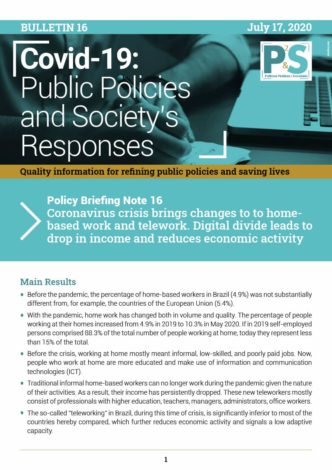Main Results
- Before the pandemic, the percentage of home-based workers in Brazil (4.9%) was not substantially different from, for example, the countries of the European Union (5.4%).
- With the pandemic, home work has changed both in volume and quality. The percentage of people working at their homes increased from 4.9% in 2019 to 10.3% in May 2020. If in 2019 self-employed persons comprised 88.3% of the total number of people working at home, today they represent less than 15% of the total.
- Before the crisis, working at home mostly meant informal, low-skilled, and poorly paid jobs. Now, people who work at home are more educated and make use of information and communication technologies (ICT).
- Traditional informal home-based workers can no longer work during the pandemic given the nature of their activities. As a result, their income has persistently dropped. These new teleworkers mostly consist of professionals with higher education, teachers, managers, administrators, office workers.
- The so-called “teleworking” in Brazil, during this time of crisis, is significantly inferior to most of the countries hereby compared, which further reduces economic activity and signals a low adaptive capacity.
- Digital divide and poor access to ICT in low-income households are arduous limitations for the progress of telework.
- The use of the Internet for work-related activities is limited, even among Brazilians who have overcome the access barrier, which indicates that the lack of digital skills restricts telework during and possibly after the pandemic.
Work group responsible
Coordination: Rogério Jerônimo Barbosa (CEM), Ian Prates (CEBRAP, Fábio Senne (Nic.br), Leonardo Lins (Nic.br), Thiago Meireles (USP)
Researchers:
- Hellen Guicheney (CEM)
- Vitor Menezes (USP)
- Sergio Simoni (UFRGS)
- Paulo Flores (USP/CEM)
- Eduardo Lazzari (USP/CEM)
- Carolina Requena (CEM)
- Heloisa Fimiani (USP)
- João Lucas Oliveira (USP)


